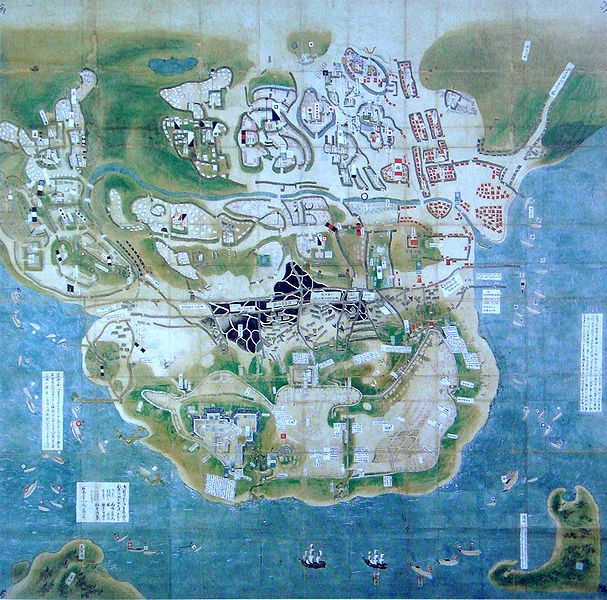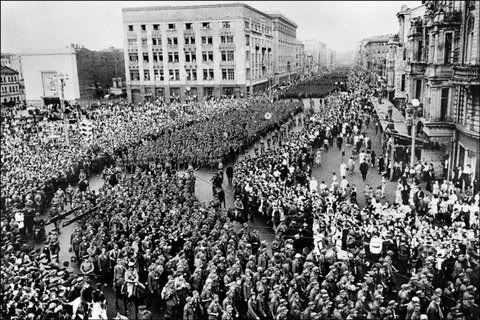 (click on the image to enlarge)
(click on the image to enlarge)
There are many “modern” ways to read into the deeper meaning of this ancient, proud Slavic song, but we shall stick to the traditional interpretation: that cossacks valued friendship and a warrior’s duty over love (and I use the last word in a very general sense).
The song is sung in a slow or quick tempo (the translation is not the best, but it will do):
From beyond the wooded island
To the river wide and free
Proudly sailed the arrow-breasted
Ships of Cossack yeomanry.
On the first is
Stenka Razin
With his princess by his side
Drunken holds in marriage revels
With his beauteous younger bride.
From behind there comes a murmur
"He has left his sword to woo;
One short night — and Stenka Razin
Has become a woman, too."
Stenka Razin hears the murmur
Of his discontented band
And his lovely Persian princess
He has circled with his hand.
His dark brows are drawn together
As the waves of anger rise;
And the blood comes rushing swiftly
To his piercing jet-black eyes.
"I will give you all you ask for
Head and heart and life and hand."
And his voice rolls out like thunder
Out across the distant land:
"Volga, Volga, Mother Volga
Wide and deep beneath the sun,
You have never seen such present
From the Cossacks of the Don.
So that peace may reign forever
In this band so free and brave
Volga, Volga, Mother Volga
Make this lovely girl a grave."
Now, with one swift mighty motion
He has raised his bride on high
And has cast her where the waters
Of the Volga roll and sigh.
"Dance, you fools, and let's be merry
What is this that's in your eyes?
Let us thunder out a chantey
To the place where beauty lies."
From beyond the wooded island
To the river wide and free
Proudly sailed the arrow-breasted
Ships of Cossack yeomanry.
Now, amongst the historians there is a great degree of disagreement regarding the question of whether Stenka Razin really did drown the Persian princess (whom he held as a hostage) and if he did, what his reasons might have been. I have just perused a
work analyzing this important chapter in Russian national history. It quotes different sources, going back to such authorities as Jan Jansen Streiss (1630–1694), Dutch “sailing master” working on a Russian ship, and Louis Fabricius (1648–1729), Dutch emissary to Persia. Let me tell you: the answer is not so simple.
Besides the traditional view presented in the mighty hymn above, another opinion says that she jumped herself after discovering that she was pregnant, but a careful analysis from military historians pointing at the time when the princess might have been captured debunks this view.
Some sources present a view that she was sacrificed to the cossack deity that was associated with either Caspian sea or Volga (like most Christians, the cossacks were rather liberal in their religious beliefs and were not bothered by the conflicts of mono- and polytheism; of course, when the time came to kill someone else for
his religious beliefs, they became rather orthodox). You see, before the cossacks departed on a raiding expedition to Caspian sea (as all Russians know, river Volga flows into Caspian sea¹) they would bring sacrifices to both the river and the sea — oftentimes human ones. For Halachic reasons, I cannot tell you the name of their maritime deity, but what I can say is that it is also the name of one American hurricane of the past.
In any event, this wouldn’t be the first time someone
sacrificed his (or her) family for religious beliefs. Although a counter-argument states that if Razin had a Persian princess as a newly-acquired captive, he would be sailing up river Volga, away from the Caspian sea and Persia, not towards them.
In reality, eastern Cossacks did capture Persian women and even settle in a colony called Persiánovka, where they started off families with their captives. Due to the mobile nature of their enterprise, however, the colony did not endure.
After the Shvuos, I will present, iyH, the different musical versions of the song.
______________
¹ “And Volga flows into Caspian sea” is a Russian way of saying “duh” — i.e., stating an obvious (and sometimes useless) fact. This
map confirms this fact. Also, it shows how long the river is: it starts north of Moscow and goes all the way to Caspian sea, north of Iran. Russia in general is known for its long rivers.
By the way, these cossacks were known as Don Cossacks, because the river Don was their main base of operation. Don and Volga are two of the three mighty Russian rivers (the third one is Dnepr). There is a place where Don and Volga come close to each other. It is a site of the city called today Volgograd, although back in the day it was called Stalingrad and was the place where one third of the whole Nazi army was encircled and destroyed by the Soviet forces.
(Of course, the three mighty rivers are those just on the European side. Siberia also sports quite a collection of long and wide waterways. One of them is called Lena and was the source of the nickname of the first leader of the Soviet Union.)
I actually wonder how a Russian version of
Three Men in a Boat (telling of a journey up or down Volga, for instance) would look like.













